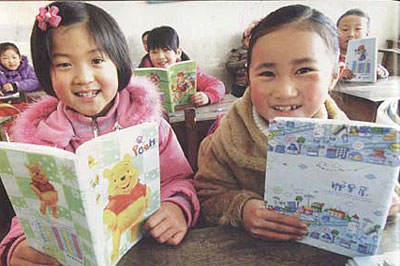|

FACE OF THE FUTURE: Over the next two years, free compulsory education will cover most of rural China
As China's 11th Five-Year Plan (2006-10) gets underway, the agricultural sector is poised to receive a major boost aimed at accelerating the development of modern agriculture, stabilizing grain production, raising farmers' income, strengthening rural infrastructure, promoting the reform of rural democracy and financial and institutional reform.
Premier Wen Jiabao said, "We should build up and carry out the concept of scientific development, improve rural living and production conditions, raise farmers' living standards and promote the whole countryside to take on a new look."
Chen Xiwen, Deputy Director of the Office of Central Financial Work Leading Group, also said that building a new countryside is the best way to solve the problems plaguing agriculture, the rural areas and farmers.
China's agriculture once made great contributions to social and economic development. The reform and opening up began in the rural areas. In 1980, the household contract responsibility system under which individual farming households were given the right of
NEW LOOK: This is not a villa in an expat neighborhood but a suburban village in Shanghai management of their contracted land and derived an income based on its output, heralded the reform process. This greatly spurred agricultural productivity and the country reaped consecutive bumper grain harvests.
In 1984, the focus of the reform process shifted to the cities. For the next 20 years, agricultural surpluses fueled industrial development and rural areas supported urban economic development. Great importance was attached to the development of industry and it began replacing agriculture as the pillar of China's social economy.
During this period, agricultural development stagnated. Fanners' income remained low and the urban-rural gap began widening. Many farmers could not afford medical care or the cost of their children's education.
Key projects
The Central Government's No. 1 document in 2006 details "the building of a new socialist countryside." It talks of building areas characterized by enhanced production, higher living standards, healthy rural culture, neat and clean villages and democratic administration.
Production can be enhanced by adopting the practices of modern agriculture, innovation, stabilizing grain production, promoting agricultural restructuring, and speeding up the development of resource-efficient and environmentally friendly fanning.
Higher living standards call for more sustainable avenues of revenue generation for farmers while the fostering of a healthy rural culture involves the speeding up of compulsory education in the rural areas and the establishment of a culture industry.
Neat and clean villages will happen only when rural infrastructure is strengthened and sanitary conditions are improved. Similarly, a democratic administration will flow from a completion of the villagers' self-governance system and a further improvement in the transparency of rural affairs.
The Chinese Government is zeroing in on 14 key projects in the next five years for building a new countryside, including establishing large production bases for grain, cotton and oil, solving the problem of a shortage of potable water for 100 million farmers, building and rebuilding over 120 million km of rural roads, completing the provision of rural medical and health care services and enabling the absorption of surplus labor from the rural areas.
| 